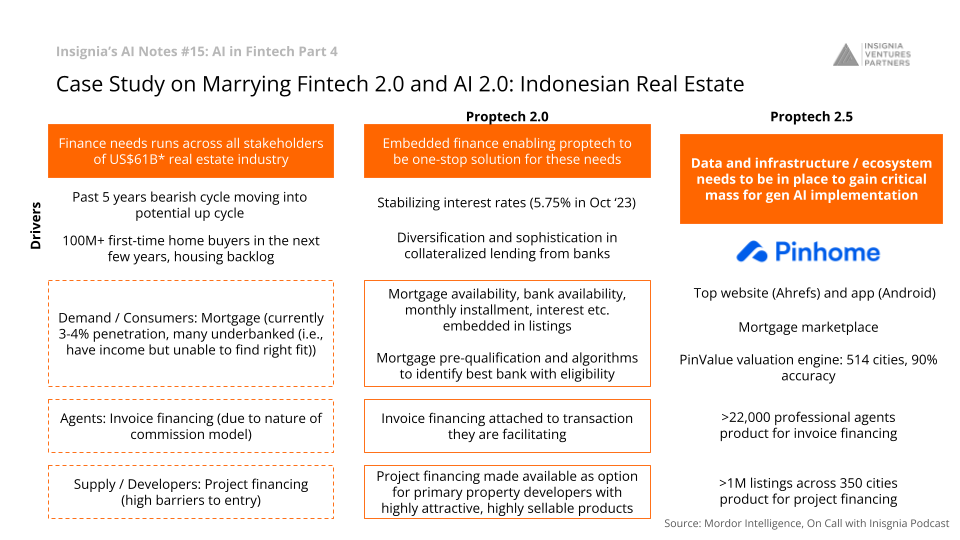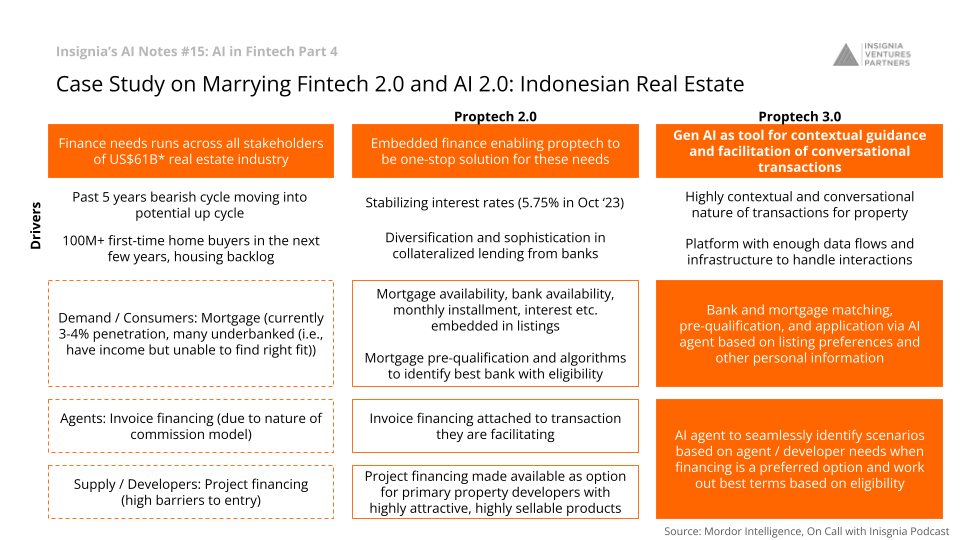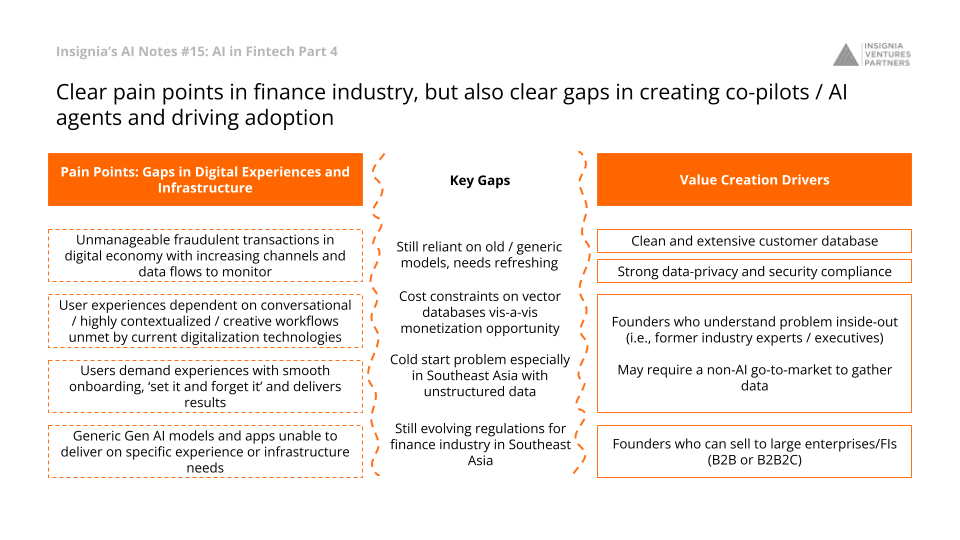For the final part of our AI in Fintech section of our AI Notes series, we share a case study on how AI 2.0 or generative AI can elevate the value made more accessible through Fintech 2.0 or embedded finance: Indonesian real estate.
Check out our previous case study on personal finance management in Southeast Asia
This case study demonstrates how gen AI can make fintech journeys/applications much more ubiquitous than it is today, as well as what it will take to build such a platform marrying the two. Then we wrap up this section covering the pain points, value creation drivers, and ultimately the gaps between these two in Southeast Asia.
Case Study on Marrying Fintech 2.0 and AI 2.0: Indonesian Real Estate
Real estate in Indonesia is not just an asset class but a colossal financial playground ripe for innovation. “Real estate is a very large asset class, perhaps the largest for Indonesia compared to other asset classes. And it’s really ripe for transformation when it comes to financing,” says Dayu Dara Permata, CEO and co-founder of Pinhome, an end-to-end property transaction platform in Indonesia, on our podcast.

Case Study on Marrying Fintech 2.0 and AI 2.0: Indonesian Real Estate Part 1
Finance Needs Across All Stakeholders in the US$61B Real Estate Industry
Demand/Consumers: With mortgage penetration as low as 3-4%, many are underbanked, meaning they have income but can’t find the right financial fit.
Agents: Due to the commission model, agents need invoice financing.
Supply/Developers: Project financing is essential but has high barriers to entry.
Drivers: An emerging bullish market and the backlog in housing indicate a surge in first-time homebuyers in the next few years.
Embedded Finance as the One-Stop Solution
Embedded finance in platforms like Indonesian proptech Pinhome aims to resolve these issues by integrating various financial services directly within the real estate listings. These services range from mortgage pre-qualification to finding the best-suited banks for consumers, invoice financing for agents, and project financing for developers.
Drivers: With stabilizing interest rates and growing diversification in collateralized lending, embedded finance is gaining traction.
“Knowing that financing is a very important piece of the interactions and of the whole kind of real estate transaction, consumers want financing to be embedded. Consumers want the financing to be there as they are searching for their first home or their next homes.
Embedded finance is an integration of fintech within the Pinhome platform. We want to be that one-stop solution where, you know, if you think about how we manifest that, it is through financial consultations that are attached throughout the home seeker’s journey.” – Dayu Dara Permata, CEO and co-founder of Pinhome
The Infrastructure Needed for Generative AI
Pinhome’s data flywheel and ecosystem have been paving the way for the implementation of Generative AI. The platform has been able to scale across various cities and maintain a strong brand amongst users (#1 website on Ahrefs and #1 app on Android mobile), aiding in creating a robust data pool to feed into AI systems.

Case Study on Marrying Fintech 2.0 and AI 2.0: Indonesian Real Estate Part 2
Generative AI as the Game Changer
Generative AI comes in as a tool for providing contextual guidance during transactions. These AI-driven agents can match banks and mortgage options for consumers, advise agents on invoice financing, and help developers with project financing, all based on real-time data and personal information.
Drivers: An AI-enabled system demands a robust platform capable of handling a vast flow of data and interactions, which platforms like Pinhome have been actively developing.
“So this data infrastructure that we’ve built, what is needed now is that it needs to be adaptable and scalable, right…Specifically for the core Gen AI infrastructure, this really centers around the vector database, where you store vector representations of your data.
This is essential for contextual search and is a foundational component to serve all the various use cases for the end user….interestingly, due to the constraints in the costs of LLMs, it results in a lot of unique and new techniques for us to work around those. So tapping into those learnings would be essential.” – Ahmed Aljunied, CTO and co-founder of Pinhome
More on Pinhome’s approach to building an end-to-end proptech for first time homebuyers as well as their views on Generative AI on our podcast
Pain Points, Value Creation Drivers, and Gaps in Embedding AI into Finance
Even with the advancements in Fintech and AI, there are evident gaps and pain points, especially in Southeast Asia.

Clear pain points in finance industry, but also clear gaps in creating co-pilots / AI agents and driving adoption
Clear pain points in finance industry, but also clear gaps in creating co-pilots / AI agents and driving adoption
Gaps in Digital Experiences and Infrastructure
- High instances of fraud
- Limited user experiences due to unmet technological demands
- Inability of generic AI models to provide tailored solutions
Value Creation Drivers
Companies need to focus on:
- Maintaining clean and extensive customer databases
- Ensuring data-privacy and security compliance
- Understanding the industry inside-out
- Crafting a non-AI go-to-market strategy to gather data (more applicable to more traditional industries)
Key Gaps in Southeast Asia
- Over-reliance on old or generic models
- Cost constraints affecting the implementation of advanced databases
- Challenges in dealing with unstructured data
- Evolving regulations in the financial sector
Conclusion
While the market is bustling with potential, especially in Southeast Asia, the real breakthrough will happen when Fintech 2.0 and AI 2.0 can be effectively married. Platforms like Pinhome are at the forefront of this fusion, aiming to streamline the cumbersome processes in the real estate sector by implementing embedded finance and Generative AI. Yet, there are gaps to be filled and problems to be solved for this vision to be fully realized.
The journey has just begun, but the destination promises a future where fintech is not just everywhere but also smarter, thanks to Generative AI.
Follow our LinkedIn page for the latest updates on our weekly AI insights and other insights in Southeast Asia’s innovation landscape.
Author’s Note: This article was written with insights and research from our investment team. Reach out to them if you’re building in this space out of Southeast Asia and would like a deeper conversation.
Subscribe to our newsletter to stay tuned for an upcoming AI Report!

Follow us on LinkedIn for more AI insights every Wednesday
Paulo Joquiño is a writer and content producer for tech companies, and co-author of the book Navigating ASEANnovation. He is currently Editor of Insignia Business Review, the official publication of Insignia Ventures Partners, and senior content strategist for the venture capital firm, where he started right after graduation. As a university student, he took up multiple work opportunities in content and marketing for startups in Asia. These included interning as an associate at G3 Partners, a Seoul-based marketing agency for tech startups, running tech community engagements at coworking space and business community, ASPACE Philippines, and interning at workspace marketplace FlySpaces. He graduated with a BS Management Engineering at Ateneo de Manila University in 2019.